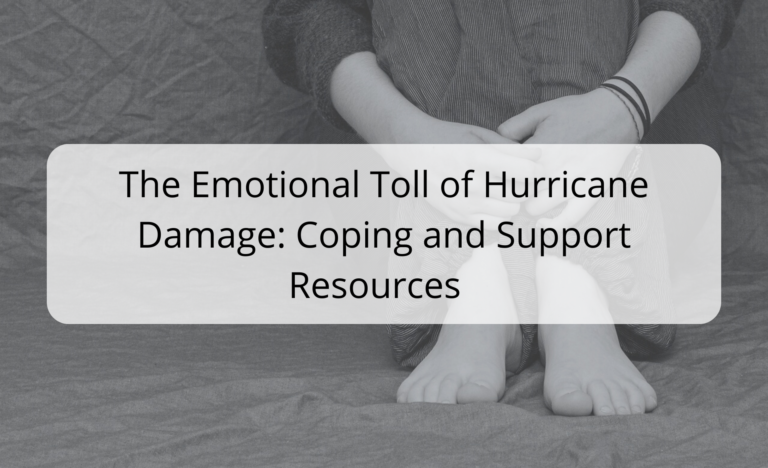When the winds howl, the skies darken, and the rains pour, hurricanes leave behind more than just physical destruction. They upend lives, shatter routines, and unleash an emotional storm that can linger long after the winds have subsided. The aftermath of a hurricane is not just about rebuilding structures; it’s about rebuilding lives and finding the resilience to overcome the emotional toll left in its wake. In this blog, we delve into the profound emotional impact of hurricane damage, offering insights, coping strategies, and vital support resources to help individuals and families navigate the challenging path to recovery.
The Emotional Impact: Beyond the Visible Damage
Hurricanes leave a mark that extends far beyond the visible destruction. The experience of witnessing the power of nature’s fury can trigger a range of emotional responses, from fear and anxiety to grief and overwhelming stress. The loss of cherished possessions, disruption of daily routines, and the uncertainty of the future can compound these feelings, leading to emotional exhaustion.
Coping Strategies in the Aftermath: Navigating Emotional Turbulence
- Acknowledge Your Feelings: In the wake of a hurricane’s devastation, a whirlwind of emotions can sweep through your heart and mind. It’s important to give yourself permission to feel without judgment. Understand that there’s no “right” way to react. Emotions like fear, sadness, anger, and even moments of hope are all valid responses to such an overwhelming experience. By acknowledging these feelings, you’re taking a significant step towards healing.
- Reach Out for Support: Remember that you’re not alone in this journey. The power of leaning on your support network, whether it’s friends, family, or neighbors, cannot be underestimated. Sharing your experiences and emotions with those who care about you can provide a profound sense of relief. Sometimes, just talking about what you’re going through can lighten the emotional load you’re carrying. Never hesitate to ask for help when you need it; it’s a sign of strength, not weakness.
- Practice Self-Care Amid Chaos: Amidst the chaos, making self-care a priority can be transformative. Engaging in activities that bring you comfort and relaxation can be a lifeline during tumultuous times. Whether it’s losing yourself in the pages of a book, taking a mindful walk in nature, or simply taking a few moments to breathe deeply and center yourself, these small acts of self-compassion can provide solace.
- Create a Routine for Stability: Hurricanes upend routines, creating an unsettling sense of instability. Amid the uncertainty, reestablishing even a semblance of routine can be remarkably grounding. It doesn’t have to be elaborate; even small daily rituals, like brewing a cup of tea or taking a few minutes for gentle stretching, can help restore a sense of normalcy amidst the chaos.
- Limit Media Exposure for Emotional Well-being: The constant barrage of news and images depicting the disaster can intensify stress and anxiety. While staying informed is important, it’s equally vital to protect your emotional well-being. Allow yourself designated periods to catch up on news and then consciously disengage. Redirect your focus towards positive or relaxing activities that contribute to your sense of well-being.
In the aftermath of a hurricane, the emotional journey can be as turbulent as the storm itself. Remember that your emotional responses are valid, and seeking support is an act of courage. By embracing coping strategies that prioritize your well-being and connecting with your community, you’re nurturing the resilience needed to heal and rebuild.
Seeking Professional Support: Nurturing Emotional Recovery
- Counseling Services: The path to emotional healing after a hurricane can be complex and challenging. Trained therapists and counselors specialize in providing a safe and empathetic space for you to process your emotions. With their expertise in trauma, grief, and anxiety management, they can help you develop effective coping strategies tailored to your unique experiences. Their guidance can be instrumental in navigating the emotional aftermath of a hurricane.
- Support Groups: Connecting with others who have weathered similar emotional storms can be incredibly validating and empowering. Support groups or online communities of hurricane survivors offer more than just a platform for sharing stories; they create a space where experiences are understood on a deep level. Joining these groups provides an opportunity to exchange advice, insights, and coping mechanisms while building a network of understanding companions who truly comprehend the emotional rollercoaster you’re riding.
- Emergency Helplines: In moments of overwhelming distress, remember that you don’t have to navigate the emotional aftermath alone. Emergency helplines, staffed by trained professionals available 24/7, offer immediate support when you need it most. Their compassionate presence and guidance can provide a lifeline during difficult times, ensuring you’re not alone on this journey of healing.
Community Resources: Rebuilding Together, One Step at a Time
- Local Disaster Response Centers: Often the heart of community resilience, local disaster response centers are a beacon of hope in the aftermath of a hurricane. These centers offer more than just material aid; they provide counseling services, essential resources, and a roadmap to navigate the complex recovery process. By tapping into these centers, you’re accessing a hub of support designed to guide you toward emotional recovery and overall well-being.
- Community Events: The power of unity in the face of adversity is undeniable. Attending local gatherings, workshops, or events organized for survivors can be a transformative experience. These events bring together a community that understands the challenges you’re facing and the journey you’re on. Engaging in these gatherings not only provides opportunities to heal but also nurtures a sense of belonging and resilience that can be instrumental in rebuilding your emotional well-being.
As you traverse the path to emotional recovery in the aftermath of a hurricane, remember that seeking support is a courageous step forward. Whether through counseling services, support groups, or community resources, you’re connecting with the tools and people who are committed to helping you heal, regain your equilibrium, and rebuild your emotional landscape. Your journey matters, and there’s a network of compassionate professionals and fellow survivors ready to stand beside you.
D.A. Lamont Public Adjusters: Beyond Property Claims
At D.A. Lamont Public Adjusters, we understand that hurricane recovery goes beyond property claims. Our commitment to our clients extends to their emotional well-being as well. We encourage open communication and offer a compassionate ear to those who have experienced the emotional upheaval of a hurricane. While we specialize in navigating insurance claims, our support transcends property damage, and we are here to offer guidance and resources to help you rebuild your life, not just your property.
Together We Heal, Together We Rebuild
Hurricanes have a profound way of reshaping lives, leaving emotional imprints as indelible as the physical scars they leave behind. As you navigate the intricate terrain of emotional recovery in the aftermath of a hurricane, remember that the path forward is illuminated by the strength within you and the support around you.
Acknowledging the emotional toll of hurricane damage is an act of courage, a declaration that your well-being matters. Prioritizing self-care, seeking professional guidance, and tapping into community resources are essential steps toward healing. Every small effort, every connection forged, contributes to your overall well-being and the resilience that defines your spirit.
In times of recovery, support takes many forms – a listening ear, a guiding hand, a safe space to share your story. At D.A. Lamont Public Adjusters, we understand that the journey to healing encompasses more than just property restoration. Our compassionate team is here to support you not only in navigating the complexities of insurance claims but also in finding the resources you need for emotional recovery. You’re not alone; let us stand with you as you rebuild your life, your property, and your sense of well-being.
Remember, healing takes time, and every step you take is a testament to your strength and courage. Embrace the journey, lean on the support around you, and embrace the resilience that defines your spirit. Together, we heal; together, we rebuild.

